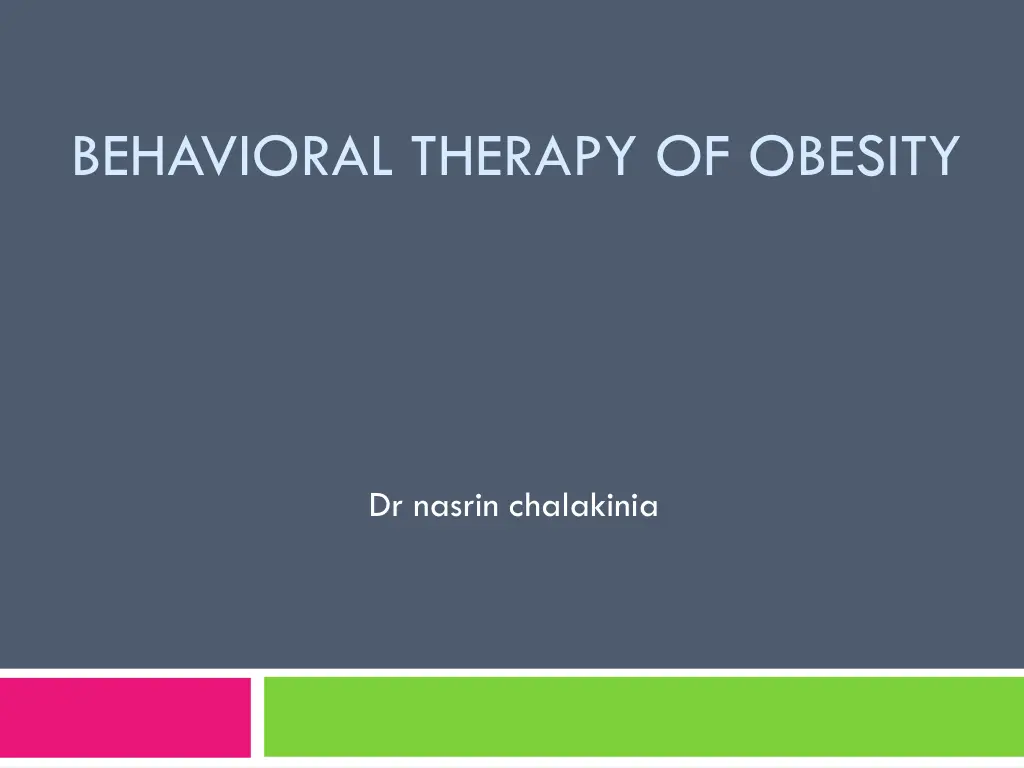
Effective Behavioral Therapy for Obesity Management
Behavioral therapy is a crucial approach for managing obesity, addressing both biological and socio-cultural factors. This therapy involves goal-setting, self-monitoring, stimulus control, behavioral skills, stress management, and problem-solving methods. Patients set achievable goals, monitor their progress weekly, and focus on lifestyle modifications for sustainable weight loss. Behavioral therapy also emphasizes the importance of self-monitoring food intake and energy expenditure for successful outcomes.
Download Presentation

Please find below an Image/Link to download the presentation.
The content on the website is provided AS IS for your information and personal use only. It may not be sold, licensed, or shared on other websites without obtaining consent from the author. If you encounter any issues during the download, it is possible that the publisher has removed the file from their server.
You are allowed to download the files provided on this website for personal or commercial use, subject to the condition that they are used lawfully. All files are the property of their respective owners.
The content on the website is provided AS IS for your information and personal use only. It may not be sold, licensed, or shared on other websites without obtaining consent from the author.
E N D
Presentation Transcript
BEHAVIORAL THERAPY OF OBESITY Dr nasrin chalakinia
Behavioral therapy of obesity obesity is a chronic metabolic disorder caused by biological , behavioral and socio-cultural factors Behavior therapy for obesity aim to make lifestyle modification necessary for weight loss and maintain this changes
Two hypotheses explained overeating Conditioned to many external food cues internal stimuli Obese eating style
Behavioral therapy of obesity stimulant Specific behavior Goal setting
Behavioral therapy of obesity key components of this approach is Goal-Setting Self-Monitoring Stimulus Control Behavioral Skills Stress management Problem solving methods
Goal-Setting Behavioral treatment specifies objective goals that can be easily measured This allows for clear assessment of progress Each patient has a target for average daily calorie intake and weekly physical activity patients expect of weight loss0.5 to 1.0 kg per week Behavioral treatment provided on a weekly basis for an initial period of 4 to 6 months
Goal-Setting Each week, patients share successful Patients often report that they appreciate the accountability that results from this check-in. Programs are focused on weight loss maintenance skills patients target a particular behavior to be changed
Self-monitoring Self-monitoring of food and energy intake is the most important skill taught in behavior therapy Self monitoring provides regular feedback about whether target behaviors are improving , deteriorating, or being maintained. self-monitoring is strongly associated with weight loss success patients keep a weekly record of all food and calculate their daily calorie intake
: 97/5/15 : / 7 7 70 50 3/1 1300 100 10 5 2500 2 300 100 70 7 1 400 200 1200 10 1 700 6740 : : 0
Behavioral Skills 7 7 70 50 1300 1/3 100 set of principles and techniques to modify eating habits: eat slowly(put your knife and spoon down after each mouthful and chew 20 times) leaving the dinner table for a short while in the middle of eating improving the type of food only putting the amount you are going to eat on your plate choosing smaller food containers
Stress management 10 5 2500 anger Bing eating Stress management
Problem solving methods 10 700 1
Stimulus Control 7 1 400 200 1200 External food cues Eating behavior Internal stimuli
Stimulus Control According to the principles of operant conditioning, reinforcing stimuli increase behavior will be repeated a person habitually several nonfood cues will stimulate her desire to eat Stimulus control was proposed restricting or break the stimuli associated with eating A simpler method of stimulus reducing the availability of cues
